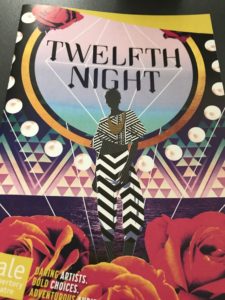
What do we want when we go to the theater?
Coincidences of April, the most compressed and hyper-busy month of the academic calendar, put me in front of two gloriously dissimilar shows in the past week: Yale Rep’s Afro-futurist romp of Twelfth Night on Saturday, and Red Bull’s brutal and violent production of John Webster’s gory revenge tragedy The White Devil on Tuesday. I loved both, but hard to image they were the same sort of thing, written for the same small theatrical community, maybe a decade or so apart. So why not try to blog-review them together?
Directed by Carl Cofield, Associate Director of the Classical Theater of Harlem, Twelfth Night showcases the talents of the Yale School of Drama’s 3rd-year acting class, as their spring Shakespeares generally do. I’ve been going to these productions since I arrived in New Haven as a grad student in the mid-90s, and long experience has moderated my expectations. But I’m not sure if I’ve seen a more rousing show in the University Theater than this funkdadelic, electro-futuristic Twelfth Night. Cofield’s set, vision, and pacing was pure Wakanda: an Afro-utopia that strutted but didn’t fret its fast two hours across the stage. I’ve seen lots of great, high-spirited Sir Tobys who convinced willing audience that the singers and drinkers have the better argument. But I’ve seldom seen a play that enlists not just Toby but also Orsino and even Olivia and Viola, into the spirit of misrule.

The White Devil, based on a lurid ripped-from-the-headlines story about adultery, murder, and intrigue in sixteenth-century Italy, didn’t quite go down as smoothly. Webster’s poetry is angry and intricate, but also gorgeous and inventive:
Sum up my faults, I pray, and you shall find,
That beauty and gay clothes, a merry heart,
And a good stomach to feast, are all,
All the poor crimes that you can charge me with.
In faith, my lord, you might go pistol flies,
The sport would be more noble.
The doomed love affair of Vittoria and Duke Brachiano, orchestrated by her brother Flamenio, spits in the face of propriety as it condemns to death their spouses and numerous bystanders. It’s sometimes hard to tell if Webster wants us to hate his villains or the pious aristocrats more. My sense is that we semi-admire the baddies for their nerve.
The star of Twelfth Night, beyond the director and the music, may have probably the veteran actor Allen Gilmore as Malvolio. As counterweight to the festive utopians, Malvolio showed just enough of the hypocrisy in ambition (and vice versa) to energize the production. Among my favorite moments of the night came at the end, when he stalked on stage during the dance-off that subbed in for a curtain call, stared everyone down, and then vogue’d his way into his own round of applause.
To facilitate the turns and twists in the violent plot of The White Devil, director Louisa Proske made repeated use of a large video screen, on which the occasional soliloquy or murder appeared. As is generally true with Red Bull’s efforts to revivify the bloody non-Shakespeare works of the early 17c, the production was well-served by strong actors and powerful momentum. Daniel Oreskes’s Brachianno may have been the most charismatic of the bunch, but Tommy Shrider’s slinky Flamenio caught my eye whenever he was on stage.
When the Yale Rep actors transformed Orsino’s famous if a bit sappy “If music be the food of love” opening speech into a nightclub dance-number, I knew we were in good hands. Music spilled out from sources both expected — Erron Crawford’s Feste as hip hop artist, Chivas Michael’s Toby as fez-topped night-club maestro — and less predictable, including Ilia Isorelys Paulino playing a joyful Maria who occasionally would belt out her lines in song because she just could not help herself. I also loved Tiffany Denise Hobbs’s Olivia, who hid in the early acts behind a hat that may as well have been a gladiatorial shield before breaking into love and movement once fetching cross-dressed Cesario catches her eye.
The question of Vittoria, the poor but proud heroine played by Lisa Birnbaum whose affair with Brachiano and defiance of patriarchal norms stirs the plot stew in Webster’s tragedy, remains vexed. Does she, like Malvolio, desire to better her station? Might she, like Viola and Sebastian, have played her hand less aggressively and made her way into elite society? That’s not Webster’s kind of play, and not his vision of the world, either in decadent Rome or the Jacobean London that’s probably his real target.

I had hoped that tonight, when I’m blogging these thoughts from home, that I’d be adding to the mix Glenda Jackson’s big Broadway Lear, though that plan foundered on the shores of a sick child. Could I have made division of myself and made it to the theater? Not hardly — which may be as much of a response to King Lear as I’ll manage tonight.
